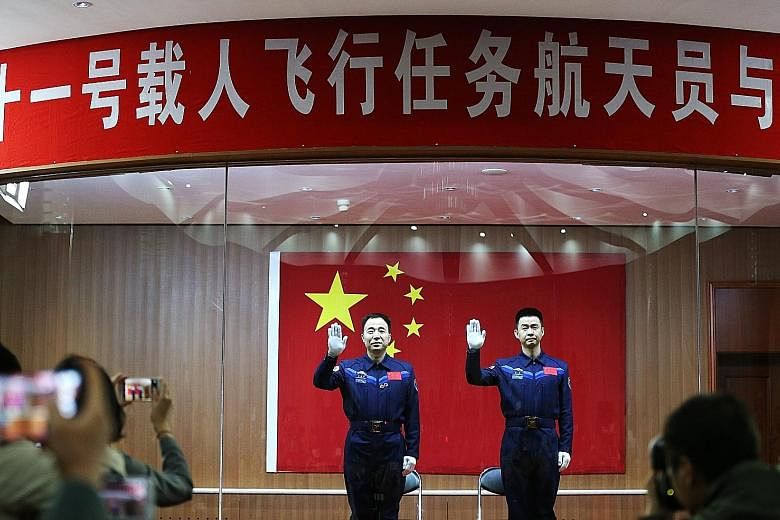BEIJING • China will launch its sixth manned space mission Shenzhou-11 today, officials with the space programme said, taking the country closer to its ambition of setting up a permanently manned space station by 2022.
After the 7.30am launch in the remote north-western province of Gansu, the mission's two astronauts will dock in two days with the orbiting space lab Tiangong-2 which was launched last month. They will spend about a month there.
Shenzhou-11, China's sixth manned mission, will end the country's three-year absence in human spaceflight.
It will be Mr Jing Haipeng's third flight into space following missions in 2008 and 2012. The former fighter jet pilot will also be celebrating his 50th birthday in space.
"Being an astronaut is my career. Space exploration is my job as well as my pursuit. It is challenging, risky, even dangerous. But honestly, this is what I love, this is what I enjoy," said Mr Jing, adding that China has improved its ability to deal with emergencies, first aid and space experiments.
Mr Jing is joined by 38-year-old Chen Dong. With a safe flight record of 1,500 hours as an air force pilot, Mr Chen was selected to join China's second batch of astronauts in May 2010 and was picked for the Shenzhou-11 mission in June. This will be his first space flight.
"This mission is characterised by its longer duration and more tests," Mr Chen told reporters in a televised news conference.
The pair will conduct research related to in-orbit equipment repairs, aerospace medicine, space physics and biology, atomic space clocks and solar storm research.
"I am looking forward to viewing Earth and our motherland from space," said Mr Chen, adding that he hoped to be able to take many photos and enjoy the celestial scenery.
The duo will be keeping a diary and sharing their experiences in space using text, audio and video footage. Xinhua said it will collect questions from readers using the #AskTaikonaut hashtag on its Twitter and Facebook accounts.
Mr Zhang Yulin, an official with the space programme and the Central Military Commission, said China's space programme will move from exploratory testing to normal operations with the launch of the next space station. He said there would be several spacecraft launches each year in the future, instead of only one every few years.
Besides establishing a permanently manned space station by 2022, China also hopes to eventually put one of its citizens on the Moon.
In 2003, China became the third nation to send a man into space and successfully completed its first docking mission with an orbiting space lab in 2011.
It has so far largely replicated activities the United States and Soviet Union pioneered decades ago.
China says its space programme is for peaceful purposes, but the US Defence Department has highlighted its increasing capabilities, saying it was pursuing activities aimed at preventing adversaries from using space-based assets in a crisis.
REUTERS, AGENCE FRANCE-PRESSE, XINHUA

